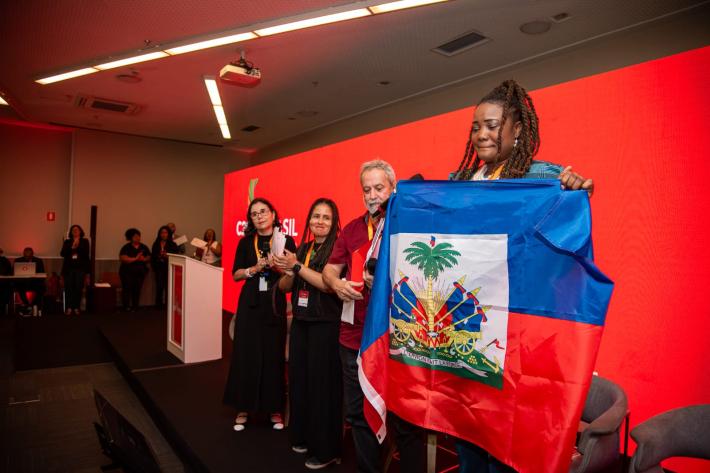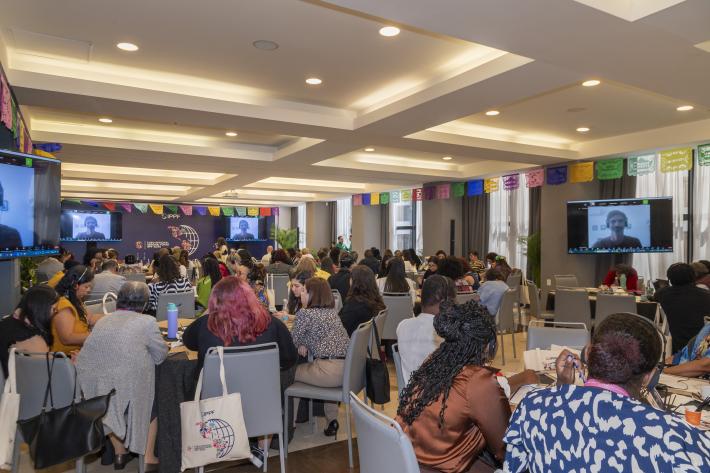Latest press releases
A selection of stories from across the Federation
Americas & the Caribbean
Breaking: IPPF Global Research Exposes Devastating Impact of the Trump Administration
Over Half of Partners and $85 Million Affected
For media enquiries

| 09 April 2025
Breaking: IPPF Global Research Exposes Devastating Impact of the Trump Administration
8 April 2025 – A new global survey of partners conducted by the International Planned Parenthood Federation (IPPF) has revealed the widespread impact of the Trump Administration’s funding cuts, putting essential sexual and reproductive healthcare at risk for millions worldwide. From the responses received, the findings show: 72 Member Associations and Collaborative Partners (62%) currently receive funding from one of the affected sources. Of those that receive core funding from IPPF, over half (57%) are facing funding cuts. This indicates that a significant majority of IPPF’s partners are facing disruptions, impacting access to essential sexual and reproductive health services worldwide. 156 critical healthcare projects are either already terminated or at risk. At least $85.2 million in funding is directly affected or already cut. 1,737 staff members across affected organisations could lose their jobs or already have. 3,961 service delivery points, including clinics and mobile units, are at risk of closure or have already closed. 8.5 million people could lose access to lifesaving SRH services. These funding cuts are expected to have severe consequences on people’s lives for the communities we serve. If all funding at risk is indeed cut, IPPF estimates this will result in an additional 3,844 maternal deaths, over 3 million unintended pregnancies, and 756,010 unsafe abortions. These impacts will also place a heavy financial burden on national health systems. The impact of the Trump Administration’s actions is particularly severe in Africa and South Asia, where many IPPF Member Associations depend on international funding to provide contraception, maternal healthcare, and HIV prevention services. In Venezuela, U.S. funding cuts are projected to slash up to 30% of the Member Association’s 2025 annual budget, with an estimated $229,650 in lost project funding. These cuts will affect 10% of the sexual and reproductive health services provided by the IPPF Member, placing 30% of its staff at risk. Approximately 2,500 clients stand to lose access to care—an alarming number, especially as the organization is among the few still offering services for survivors of sexual and gender-based violence, particularly migrating women and girls. In St. Vincent and the Grenadines, an estimated $10,000 in lost project funding will impact 90% of SVPPA’s sexual and reproductive health services. The organization is facing the potential loss of its entire staff, threatening its ability to operate. With 8 service delivery points at risk, these cuts could eliminate access to vital care, particularly for young people, in one of the country’s few youth-friendly providers. In the United States, independent reports outside of this survey indicate that the Trump Administration intends to freeze funding for affordable contraception and reproductive health care for low-income individuals who rely on Planned Parenthood health centers. To address the immediate crisis, IPPF has launched a Harm Mitigation Task Force to assess the evolving situation and provide emergency funding to its most affected Member Associations and Collaborative Partners. The first round of grants will be issued in April 2025, in an effort to ensure that critical healthcare services and access to life saving health commodities can continue. “We will not allow political decisions to determine who can and cannot access healthcare,” said Dr. Alvaro Bermejo, Director-General of IPPF. “At IPPF, we are doubling down. We are a resilient Federation with a long history of overcoming challenges. Our focus now is on mitigating harm, mobilising new resources, and ensuring that people who rely on us for care are not left behind.” For media inquiries, please contact: [email protected] To support our Emergency Fund for IPPF Member Associations and Collaborative Partners most impacted by the funding cuts, click here. NOTES In February 2025, IPPF launched a survey to hear from its Member Associations and Collaborative Partners about the impact of the actions of the Trump administration. We asked them about programmes cancelled both from direct US sourced funds and indirectly through other impacted sources as well as the effect this would have on their staff, service delivery points, clients served, and SRH commodities. The survey was completed by 117 of IPPF’s 158 Member Associations and Collaborative Partners. IPPF will do a follow-up survey in mid-2025 to assess ongoing impacts, acknowledging that the situation is changing rapidly. Through the survey process, the value reported by MAs and CPs of their current funding affected is at least $48.8 million. This includes funding already lost or funding at risk across affected sources. There is a further $20.9 million in 44 pending proposals that now won’t come to fruition. Additionally, the IPPF Secretariat stands to lose $15.5 million in contracted work. Altogether, IPPF’s total estimated funding affected is $85.2 million.

| 27 March 2025
We condemn Trinidad and Tobago’s Upholding Criminalization of Same-Sex Activity
The Trinidad and Tobago Court of Appeal’s decision to uphold the criminalization of consensual same-sex activity is an alarming assault on human rights. This ruling, which reinstates the criminality of private, consensual intimacy, is a direct violation of the fundamental rights of LGBTQI+ people and a stark reminder of the colonial-era laws that continue to inflict harm across the Caribbean. IPPF Americas and the Caribbean Regional Office (ACRO) together with local member Family Planning Association of Trinidad and Tobago (FPATT) stand unequivocally with LGBTQI+ communities in Trinidad and Tobago and across the region. We reject this ruling and any legislation that denies people their right to love freely and live with dignity. This decision reflects a justice system with oppressive statutes that have no place in a just and democratic society. According to Eugenia López Uribe, Regional Director of IPPF ACRO, this ruling is not just a setback for LGBTQI+ rights, it is an attack on human dignity: “It is a deliberate attempt to silence, criminalize, and exclude a part of citizens and people living in the country. But let this be clear: IPPF regional office in the Americas and the Caribbean will continue fighting for and with the LGBTQI+ movement so they won’t be silenced. IPPF will not back down. LGBTQI+ people’s rights are non-negotiable. " Criminalizing LGBTQI+ lives perpetuate violence, discrimination, and stigma. It emboldens hate, undermines access to justice, and creates a climate of fear where LGBTQI+ individuals are forced to live in further vulnerability. Research published by CAISO: Sex and Gender Justice’s Wholeness and Justice programme in 2023 indicate that 1 in 3 LGBTQI+ individuals in Trinidad and Tobago experience discrimination and harassment, 1 in 4 face family violence, and 1 in 4 experience physical assault. “FPATT [Family Planning Association of Trinidad and Tobago] notes the recent Court of Appeal decision that affirms an old law before independence that criminalizes persons of a different orientation, due to a technicality- the saving law clause,” says Professor Rose Marie Antoine, FPATT’s Board of Trustees President. “Interestingly, the British colonial masters that drafted that law have long abolished it. We note too that this was not a unanimous court decision. FPATT looks forward to the day when our legal system and laws can reflect true equity and non-discrimination, serving all our nation’s peoples in their access to fundamental rights and protecting vulnerable groups from harm and violence. FPATT will continue to welcome and serve all people regardless of their sexual orientation.” We call for urgent action: The immediate repeal of Sections 13 and 16 of the Sexual Offences Act. A commitment from Caribbean governments to decriminalize same-sex relations and protect LGBTQI+ individuals from discrimination and violence. An end to the use of colonial-era "savings law" clauses to justify human rights violations. Now is the time for every human rights defender, policymaker, and ally to take a stand. LGBTQI+ people in Trinidad and Tobago—and across the Caribbean, our region and the world—deserve justice, equality, and the freedom to live without fear. IPPF will not stop until that is a reality. For more information, please contact [email protected] - +44 7918 845944 About the International Planned Parenthood Federation IPPF is a global healthcare provider and a leading advocate of sexual and reproductive health and rights (SRHR) for all. Led by a courageous and determined group of women, IPPF was founded in 1952 at the Third International Planned Parenthood Conference. Today, we are a movement of 158 Member Associations and Collaborative Partners with a presence in over 153 countries. Our work is wide-ranging, including comprehensive sex education, provision of contraceptive, safe abortion, and maternal care and responding to humanitarian crises. We pride ourselves on being local through our members and global through our network. At the heart of our mission is the provision of – and advocacy in support of – integrated healthcare to anyone who needs it regardless of race, gender, sex, income, and crucially no matter how remote.

| 21 January 2025
Our Statement on Trump administration’s decision to withdraw financial support from WHO
January 21, 2025—The International Planned Parenthood Federation (IPPF) strongly condemns the Trump administration’s decision to withdraw financial support from the World Health Organization (WHO). This executive order will have devastating consequences for Americans, global health and the communities we serve. This decision, which gives a one-year notice before taking effect, will severely undermine the WHO’s capacity to carry out its critical mission and will cost lives. As the largest single contributor to the WHO, the United States provides approximately 18% of the organization’s funding, with the current two-year budget for 2024-2025 set at $6.8 billion. The withdrawal of U.S. funding will create an unprecedented financial shortfall, threatening essential health programs, partnerships and global public health. Since its establishment in 1948 as part of the United Nations, the WHO has been at the forefront of global health initiatives. From combatting malaria and tuberculosis to improving women’s and children’s health, nutrition, and sanitation, the WHO’s role in coordinating international health policy, prevention and disease eradication is indispensable. Today, it serves as a vital hub for research, technical support, and health trend monitoring, addressing some of the world’s most pressing health challenges, including sexual and reproductive health and rights. The global maternal mortality ratio has stagnated since 2016 at around 223 maternal deaths per 100 000 live births. Only one WHO region (the South-East Asia Region) has recorded a significant decline in maternal mortality, while all other regions have recorded either a stagnation or an increase. "Defunding the WHO is a direct attack on the health and well-being of millions, especially the most vulnerable,” said Dr Alvaro Bermejo, IPPF’s Director-General. “Donald Trump’s decision to strip the WHO of its funding, before the expansion of the Global Gag Rule, adds further insult to injury. The health community has collectively endured unprecedented attacks against health care workers, patients and clinics, made possible with the previous US administration. Peace is the best medicine; we urge the Trump Administration to reconsider its position. The world needs a thriving WHO. Women, girls and LGBTQ+ people all over the world need a thriving IPPF. IPPF stands in solidarity with Dr Tedros Adhanom Ghebreyesus and with the WHO. We will continue to resist, and we will continue to fight for peace, and for sexual and reproductive health, rights and justice for ALL.” IPPF calls on the international community to stand in solidarity with the WHO and to work together to mitigate the catastrophic impact of this funding withdrawal. The lives and health of countless individuals are at stake, and we must act urgently to ensure that global health systems remain strong and resilient. For more information please contact [email protected] About the International Planned Parenthood Federation IPPF is a global healthcare provider and a leading advocate of sexual and reproductive health and rights (SRHR) for all. Led by a courageous and determined group of women, IPPF was founded in 1952 at the Third International Planned Parenthood Conference. Today, we are a movement of 158 Member Associations and Collaborative Partners with a presence in over 153 countries. Our work is wide-ranging, including comprehensive sex education, provision of contraceptive, safe abortion, and maternal care and responding to humanitarian crises. We pride ourselves on being local through our members and global through our network. At the heart of our mission is the provision of – and advocacy in support of – integrated healthcare to anyone who needs it regardless of race, gender, sex, income, and crucially no matter how remote.

| 22 December 2023
IPPF's Impact on Sexual and Reproductive Health and Rights in 2023 in the Americas and the Caribbean
Forging Change, Weaving Connections: IPPF's Impact on Sexual and Reproductive Health and Rights in 2023 in the Americas and the Caribbean As the year 2023 draws to a close, we at IPPF express our sincere gratitude for your unwavering work that has been instrumental in advancing sexual and reproductive health and rights throughout the Americas and the Caribbean. As we reflect on the year, we celebrate our collective achievements in pursuit of a more inclusive, accessible, rights-based and people-centered landscape. It has been an honor to walk together, and we highlight some key initiatives in communities in 30 countries across the region. After our regional meeting in Panama, we look forward to further strengthening our partnerships and continuing to weave together lasting actions to create meaningful change in our region, learning from each other's experiences and expertise. Looking ahead, we look forward to continuing this important work in 2024 with even more strength and exchange - together, let's shape a future in which sexual and reproductive rights are accessible to all people! Expanding Access to Sexual and Reproductive Health and Rights We are present in 26 countries in the Americas and the Caribbean, advocating and providing sexual and reproductive health information and services. We provided more than 18,545,339 sexual and reproductive health services throughout the Americas and the Caribbean. Of these, 36% were provided to young people under the age of 25. In 2023, we welcomed 5 new Collaborating Partners: in Argentina, Guatemala, Guyana, Haiti and Venezuela, and a new Member Association in Chile. With Member Associations and Collaborating Partners, we developed a work plan to guide our priorities as a region. We worked with Women Living with HIV to improve health services to address their sexual and reproductive health needs and ensure their free and safe motherhood. Together with our membership and strategic partners, we launched the Caribbean Observatory on Sexual and Reproductive Health and Rights in Trinidad and Tobago in December to strengthen evidence-based advocacy. We connected advocacy at the regional and global levels to build collective responses. Together with Amnistía Internacional, Red por la Salud de las Mujeres Latinoamericanas y del Caribe (RSMLAC), Redlactrans, Redtrasex, Synergistic - Iniciativa por los Derechos Humanos and Vecinas Feministas por la Justicia Sexual y Reproductiva en América Latina, we launched the regional alliance for human rights and promoted the inclusion of sex workers. We created and strengthened alliances with collectives and organizations in the Caribbean such as Feminitt Caribbean, Caribbean Vulnerable Populations Coalition and ECADE to advance the rights of LGBTIQ+ people and youth. We strengthened alliances with ILGA World and AWID to discuss trans and feminist solidarity. We articulated with organizations and agencies such as UNAIDS, ECLAC, UNFPA, UN Women and EPF to continue positioning the sexual and reproductive health and rights agenda. Together with Member Associations and Collaborating Partners, we issue recommendations for decision makers on key issues such as early unions, sex work, abortion and youth. Acting with Youth at the Center IPPF's new regional youth network held its first meeting to strategize and elect its steering committee. We increased the presence of youth on the IPPF ACRO team to better serve their needs. The IPPF Youth Network participated in the 10th Anniversary of the Montevideo Consensus and in the Board Meeting of the Regional Conference on Population and Development. We are stronger in social networks and the media. We expanded the dissemination of strategic messages on our priority issues in the region. We positioned ourselves as leaders in DSDR in media outlets such as Subele a la Radio, Pressenza, El Soberano.org, La tercera and El Observador Mundial, among others. We reach more than 15k people around the region with greater incidence in Peru, Mexico, Barbados, Guyana, Suriname, Colombia, Trinidad and Tobago, Argentina, Aruba and the United States.

| 16 October 2023
IPPF ACRO express concern over guidance of the Zambian Ministry of Health who advised against the use of the term “sexual and reproductive health and rights”.
At a time of profound and multiple crises, it is worrying that the focus of any government's action is to go back on already consolidated international commitments, particularly those which recognize, based on evidence, that Sexual and reproductive health and rights (SRHR) are fundamental human rights, central to eradicating poverty and achieving sustainable development across its social, economic, and environmental dimensions. SRHR – which encompasses a range of issues, including universal access to SRH services and supplies, comprehensive sexuality education, and ending gender-based violence and harmful practices such as early, child and forced marriage – are fundamental to the ability of all people, especially women, adolescent girls and young people, to lead full, satisfying, healthy and productive lives. SRH services are a critical aspect of SRHR, but a complete understanding of sexual and reproductive health and rights goes far beyond on access to health facilities and services to include an array of social, legal, institutional, and financial arrangements that enable individuals to exercise their rights in general and addresses the underlying social determinants. In this regard, our Latin American community urges the government of Zambia to review its position and, on the contrary, to improve and expand the SRHR services, including increasing funding in this sector, for example by investing in fulfilling the human rights of women and girls, in all their diversity, as gender discrimination is one of the leading determinants of poor health and unwanted SRHR outcomes. It is also key to addressing inequities in access due to poverty and multiple forms of discrimination, stigma and social and economic exclusion affecting various population groups. We conclude by highlighting the importance of evidence-based policies and, in 2023, the data indicates that effective policies are not those based on stigma and discrimination or elimination of rights. On the contrary, effective policies are those that include, care for, and treat all people as subjects of rights, capable of making decisions about their health and reproductive life, with the support of a State committed to promoting citizenship and the human dignity of their people. Here, at IPPF ACRO, we will remain attentive and always willing to contribute so that rights do not go backwards and no one is left behind. In solidarity, Eugenia Lopez Uribe Regional Director for the Americas and the Caribbean

| 06 June 2023
Launch of the Alliance for Sex Workers Rights
The Alliance for Human Rights and the Inclusion of Sex Workers in Latin America and the Caribbean demands an end to the criminalization of people who perform sex work and urges states to protect their human rights. This Alliance seeks to visibilize sex workers, who are invisible in the eyes of the States, leaving them in with total lack of protection and in violation of their rights. People who engage in sex work, mainly cis and trans women, are exposed to suffering a whole series of abuses against their Human Rights, such as sexual and physical violence, extortion, and discrimination, as well as torture and murder. We understand that in a world that is in full deconstruction of paradigms anchored in patriarchy, it is urgent to guarantee the rights of a sector that determines itself and exercises the right to make autonomous decisions about their lives and their bodies. Sex workers do so of their own free will, are of legal age and understand this task to generate their income. Criminalizing adult, voluntary and consensual sexual relations - including the exchange of sexual services - is incompatible with the Human Rights to personal autonomy, dignity, and privacy, among others, while denying the capacity to act to a determined group of women does not only is it absolutely patriarchal, but it is also opposed to all conventions that purport to reinforce the right of women to give or withhold their consent. This Alliance fights to end the exploitative conditions to which people who do not have the protection of the State are subjected due to anachronistic legislation, without considering the voice of the protagonists and strongly condemns human trafficking and forced labor. We seek to guarantee public policies and legislation that protect the Human Rights of people who perform sex work and combat the crimes and abuses that today are carried out against thousands of them. Our organizations are leading civil society networks and Human Rights organizations. We have decades of experience and knowledge in Human Rights, sexual and reproductive health and rights, HIV, harm reduction, the rights of LGBTIQ+ people, digital rights, the fight against human trafficking, migration and racial justice, among other topics. Within these numerous fields of expertise, organizations have come to the same conclusion: Criminalization is not the solution. Only by adopting a human rights-based approach, decriminalizing all aspects of sex work, and meaningfully and genuinely including sex workers and human rights defenders in decision-making can they be protected. The criminalization of consensual and paid sexual relations between adults continues to have a negative impact on the lives of sex workers and, in particular, on their access to health and justice. Despite calls by some organizations to abolish prostitution; to protect and rescue; people who sell sexual services, there is no evidence that criminalizing sex workers, their clients or third parties has a positive impact on the life or human rights of sex workers. To the contrary, decades of evidence from academic research, civil society organizations, and from sex workers themselves clearly indicate that policing, repressions, and criminalization directly harm health, well-being, and social inclusion. It is important to highlight the process that has been taking place in New Zealand since 2003, where there is evidence that shows substantial changes in the lives of sex workers after the decriminalization of sex work. This State made extensive calls and discussed public policies with the premise of cessation of the violation of rights, avoiding the generation of punitive regulations with a high moral charge that end up criminalizing people. Violence rates have dropped drastically.
















